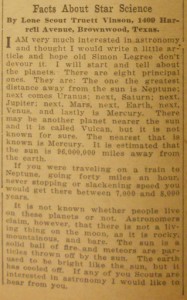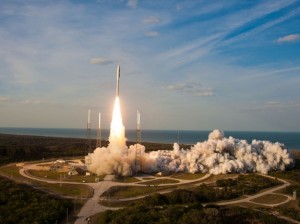I’m teaching a graduate seminar on “Science & Architecture” this semester. Last week, we focused on the origin and development of the field of architectural acoustics, with much of our energy directed toward the shift in construction and sound engineering after the introduction of Hollywood “talkies.” Near the end of class, we brainstormed a list of scientific discoveries that might have been as disorienting as the move from silence to recorded sound in movies. Telephones, electricity…all the usual suspects. A few weeks ago, we’d discussed the possible cultural repercussions of the work at CERN, so that subject came up once more. Perhaps because I’d just wrapped up online discussion on the subject, my own contribution to the list was the discovery of Kuiper belt objects and the subsequent reconfiguration of our solar system to include only eight, rather than nine, planets. Who knew my facebook friends could be so emotionally invested in a nine planet solar system?
Earlier this evening, when I stumbled upon Truett Vinson‘s 1919 contribution to the Lone Scout magazine on REH: The Two-Gun Raconteur, I wished I could revise last week’s answer. I suspect the discovery of Pluto was ultimately more disorienting than the demotion of Pluto. It’s rough having your certitude shattered by science. At least Truett Vinson was mentally prepared for the possibility of a ninth planet, even if he was looking for it in the wrong place. That he was thinking about Vulcan at all is pretty amazing—most astronomers had given up on Vulcan by the end of the 19th century. By 1915, when Einstein’s theory of relativity explained the discrepancies in Mercury’s perihelion precession, (almost) everyone else had decided they were on a wild goose chase, too.[1] So, I’d really like to take a look at Vinson’s high school textbook—when was it published? How did it describe the hypothetical Vulcan? And what did Vinson think when Lowell Observatory announced the discovery a ninth planet some 4.4–7.4 billion km distant from the Sun?
———————-
[1] Actually, the hunt for Vulcan continues today, but its been recast as a search for intra-Mercururial objects, or vulcanoid asteroids.

